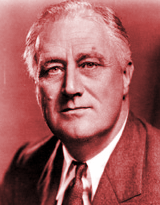 This is a long post, so I’ll put the conclusion first and let you decide if you want to see how I got here or not. It comes from wondering how the Republican Administrations can be so cavalier about finances – running up the National Debt, borrowing money from China, supporting programs that lead us into a Recession. I refuse to believe they are just dumb. And they seem so unrepentant when it happens. Then I heard George W. Bush answer the question, "Do you have any regrets?" He answered, "Yes, that I wasn’t able to privatize Social Security."
This is a long post, so I’ll put the conclusion first and let you decide if you want to see how I got here or not. It comes from wondering how the Republican Administrations can be so cavalier about finances – running up the National Debt, borrowing money from China, supporting programs that lead us into a Recession. I refuse to believe they are just dumb. And they seem so unrepentant when it happens. Then I heard George W. Bush answer the question, "Do you have any regrets?" He answered, "Yes, that I wasn’t able to privatize Social Security."
So I’ve been looking over the history, and what I think is that their fiscal irresponsibility has a point. I think they’re actively trying to put us in a financial pinch that means we have to jettison Social Security and Medicare. More than that, they are systematically trying [successfully] to undo all of the programs and reforms of the New Deal – FDR’s reforms from almost 80 years ago. They never got over it!
I don’t think this is a paranoid fantasy of mine. I think it is an active agenda of theirs…
REGULATION
Several decades before the 1929 Stock Market Crash, there was a harbinger of things to come – the Panic of 1907. That run on the Banks was aborted by financier, J.P.Morgan, and resulted in the formation of the Federal Reserve Bank and the closing of the Bucket Shops:
|
Then after the "roarin’ twenties" came the main event – the Stock Market collapse in 1929. The economic regulations ultimately enacted to deal with the Great Depression that followed were elegantly simple:
|
Banking Regulations: Congress passed the Glass-Stegall Act. This reform legislation had two parts:
In order to put a stop to the destructive runs on Banks, the Federal Government got into the Insurance business, insuring Savings Accounts for up to $100,000 in case of Bank failure.
•The Separation and Regulation of Commercial and Investment Banks:
This is the part known as regulation. Hearings disclosed obvious conflicts of interest when Banks invest money from their vast holdings in Savings Accounts. So, the Bill imposed strong restrictions on investing by these banks [Commercial Banks]. Likewise, the behavior of Banks that were involved in investing were also heavily regulated. The design here was clear, In the boom before the Crash, Banks had loaned money to people to put in the Market and had invested their assets as well. Glass-Stegall imposed restrictions to stop speculators from using other people’s money. Bank size [merger] was also regulated.
|
|
Stock Market Regulation: A series of Legislative acts culminated in the formation of the Securities and Exchange Commission [SEC] in 1934, enforcing regulation of several areas:
•Securities:
The Securities Act required any Company that registered a Stock that would be traded across State Lines file an accurate description of its activities and finances on a quarterly basis. There were stiff penalties imposed for fraudulent reporting or accounting. These reports were publicly available [now on the Internet] to allow investors insight into the Companies they were investing in.
•Stock Exchanges:
The SEC was also charged with regulating the Exchanges where Stocks were traded and policing the various New Deal Acts designed to prevent fraudulent trading practices eg insider trading.
|
|
Commodity Regulation: The Commodity Exchange Act of 1936 established a similar regulatory agency for Commodity Futures, the Commodity Exchange Authority, which became the Commodity Futures Trading Commission [CFTC] in 1974.
|
TAXATION
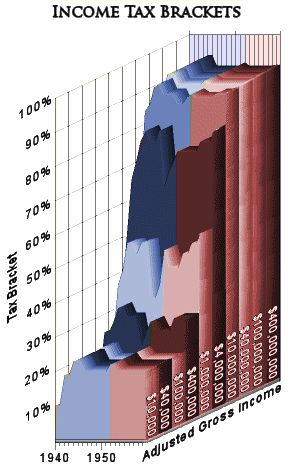 Over the period from FDR’s election to World War II, FDR’s Administration inflicted some serious hurt on the super wealthy in America. By the start of the War, the super-wealthy were turning 90% of their income over to the government up front [the graph on the left is adjusted to 2008 dollars using the GDP].
Over the period from FDR’s election to World War II, FDR’s Administration inflicted some serious hurt on the super wealthy in America. By the start of the War, the super-wealthy were turning 90% of their income over to the government up front [the graph on the left is adjusted to 2008 dollars using the GDP]. 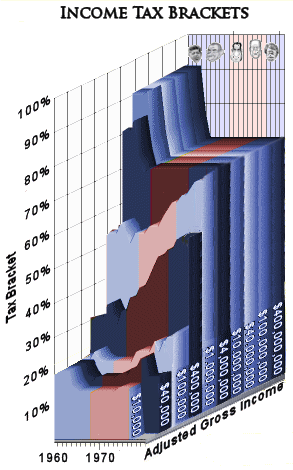 That level of wartime taxation persisted through the Eisenhower years as the Wartime Debt was repaid [oh yeah, Korean War too]. The tax burden was finally relaxed somewhat under Johnson in 1965 when he set a 70% ceiling on Income Taxes. The next 15 years of the Income tax history is shown in the graph on the right. Note that after the ceiling on the taxation of the super-wealthy was relaxed, the taxation of the moderately wealthy [>$400,000/year] began to creep upwards. That was the era of yet another expensive War in Viet Nam. There were additionally two major Social Welfare programs in the mix by this time – FDR’s Social Security program and Johnson’s Medicare program.
That level of wartime taxation persisted through the Eisenhower years as the Wartime Debt was repaid [oh yeah, Korean War too]. The tax burden was finally relaxed somewhat under Johnson in 1965 when he set a 70% ceiling on Income Taxes. The next 15 years of the Income tax history is shown in the graph on the right. Note that after the ceiling on the taxation of the super-wealthy was relaxed, the taxation of the moderately wealthy [>$400,000/year] began to creep upwards. That was the era of yet another expensive War in Viet Nam. There were additionally two major Social Welfare programs in the mix by this time – FDR’s Social Security program and Johnson’s Medicare program.
ECONOMY
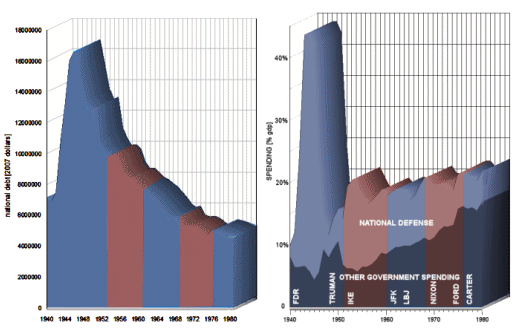
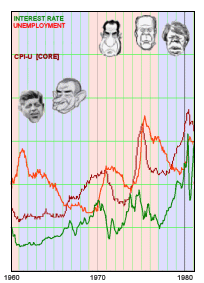 By the end of President Carter’s term, we had paid down the debt from our wars and our spending was level [compared to our production] – though domestic spending had risen significantly. The country had been through the Cold War, the Civil Rights Movement[s], a Presidential assassination, several significant Recessions, the tumultuous nineteen-sixties, the war in Viet Nam, Watergate – a lot of really big things. The structural problem in the economy of the hour was escalating Inflation. There was an additional problem that felt huge at the time – the oil embargo. The Great Depression and World War II seemed like a piece of the past – a mythical slice of history that was important, to the journey but not really relevant to the immediate news of the day. I doubt that many Americans really thought that there were lingering issues from those dark times still on the front burner. At least I sure didn’t.
By the end of President Carter’s term, we had paid down the debt from our wars and our spending was level [compared to our production] – though domestic spending had risen significantly. The country had been through the Cold War, the Civil Rights Movement[s], a Presidential assassination, several significant Recessions, the tumultuous nineteen-sixties, the war in Viet Nam, Watergate – a lot of really big things. The structural problem in the economy of the hour was escalating Inflation. There was an additional problem that felt huge at the time – the oil embargo. The Great Depression and World War II seemed like a piece of the past – a mythical slice of history that was important, to the journey but not really relevant to the immediate news of the day. I doubt that many Americans really thought that there were lingering issues from those dark times still on the front burner. At least I sure didn’t.
THE GATHERING STORM
It wasn’t any different back then – in the thirties and forties. In spite of the depth of the Great Depression, the anti-New Deal outcry was plenty loud, prompting FDR to say, "I welcome their hate." And they never stopped hating him. Many of the longtime right-wing political organizations trace their roots to anti-FDR, anti-New Deal sentiment [eg the American Enterprise Institute founded by Lewis H. Brown of the Johns-Manville Corporation – the asbestos company].


The opposition to the New Deal was so strong that FDR backed off in his second term, precipitating a recession in 1937 with 18% Unemployment. And in spite of FDR’s long reign and beloved status, the other side never stopped calling him a Socialist, a Communist, a big spender, and never accepted the regulation of the economy or his graduated taxation. Likewise, they have continued opposing Social Security, then later Medicare, and now Healthcare as Socialist Welfare policies to be dispensed with whenever possible.
Personally, I feel like kind of an idiot for not knowing how powerful those persisting anti-FDR feelings were – or at least whatever FR represented. I guess I just assumed that regulation of the Stock Markets and Banks, Social Security, and Medicare had become part of the fabric of our government. That wasn’t right. There remained a whole strand of sentiment in the business community that was basically just waiting for a chance to undo all of those programs. They essentially saw government regulation and these programs for the elderly as taking away their money, and they wanted it back. They were interfering with their ability to to do business instead of protection. I just didn’t realize how strong those feelings were. Since 1980, they’ve been deconstructing the New Deal, bit by bit…
DEREGULATION
When Ronald Reagan was elected President, he immediately set about undoing the programs from FDR’s New Deal. He called it "trickle down" economics. His opponent in the Primaries, George H.W. Bush called it "voodoo economics." I called it "tinkle on economics" [because that’s how it felt]. I never even understood what he was talking about, and it doesn’t matter because whatever he said would happen didn’t, so it didn’t matter anyway. Reagan and the Republicans began a program of deregulation immediately that continued for 28 years [through the second Bush Administration]:
|
Depository Institutions Deregulation and Monetary Control Act of 1980: This legislation expanded the Federal Reserve’s rules to all Banks, and raised the level of FDIC coverage from $40,000 to $100,000. But it also began the Derugulation of Banking Institutions and the erosion of the Glass-Stegall Act:
• Banks were allowed to merge.
• It removed the power of the Federal Reserve to set the interest rates of savings accounts.
• It allowed credit unions and savings and loans to offer checkable accounts.
• Allowed institutions to charge any interest rates they choose.
|
|
Garn-St. Germain Depository Institutions Act of 1982: This Bill was passed to deregulate the Savings and Loans Industry. From the FDIC history:
"This Reagan Administration initiative is designed to complete the process of giving expanded powers to federally chartered S&Ls and enables them to diversify their activities with the view of increasing profits. Major provisions include: elimination of deposit interest rate ceilings; elimination of the previous statutory limit on loan to value ratio; and expansion of the asset powers of federal S&Ls by permitting up to 40% of assets in commercial mortgages, up to 30% of assets in consumer loans, up to 10% of assets in commercial loans, and up to 10% of assets in commercial leases."
|
The net result of this legislation was a frenzy of corruption and mismanagement that lead to the Savings and Loans Crisis. Ultimately, 747 S&L’s failed. The cost to the taxpayers was $106 billion. It essentially lead to the 1990-1991 Recession. I suspect that it also lead to Federal Reserve Chairman Alan Greenspan’s mismanagement of the Fed Interest Rates that fueled the much larger Subprime Mortgage Crisis [the Why of Alan Greenspan’s destruction of our economy…] and the $1 trillion bailout of the "Banks too big to fail." But there was another piece of deregulation that contributed to this second collapse.
|
OTC Derivatives in 1996:
… during the Administration of George H.W. Bush, Wendy Gramm, a Ph.D. Economist and wife of Senator Phil Gramm was Chairman of the Commodity Futures Trading Commission. The not-yet-notorious Enron Corporation was lobbying to be exempted from regulation in its trading of Energy Derivatives. In 1993 as her last act before leaving, she granted the exception. She left the CFTC, and [went on the Board of Enron]. She was followed at the CFTC in 1994 by Mary Schapiro who moved on to become President of NASD. So Brooksley Born became Chairman of the Commodity Futures Trading Commission a couple of years after Wendy Gramm’s exception. By 1998, that exception had grown into a gajillion dollar, unregulated Derivatives Market. In May of 1998, Born published a "concept release" asking for input about whether and how to regulate this expanding Derivatives Market [the "dark" Market]. This idea was immediately opposed by Federal Reserve Chairman Alan Greenspan, Treasury Secretary Robert E. Rubin and Securities and Exchange Commission Chairman Arthur Levitt Jr. Then when Long Term Capital Management, a Hedge Fund heavily into Derivative Trading collapsed, she escalated her concerns about this unregulated Market in Derivatives. Her opponents responded by getting Congress to declare a 6 month moratorium on regulating Derivatives. After multiple meetings and some seventeen Congressional appearances, she gave up and left her post in June 1999. In November, the President’s Working Group on the Economy [Treasury Secretary Lawrence H. Summers, Federal Reserve Chairman Alan Greenspan, Securities and Exchange Commission Chairman Arthur Levitt Jr., and the new Chairman of the Commodity Futures Trading Commission Arthur Levitt William J. Rainer] issued a report, Over-the-Counter Derivatives Markets and the Commodity Exchange Act, unanimously recommending that these Derivative Markets continue unregulated.
|
|
Gramm-Leach-Bliley Act of 1999:
The Gramm-Leach-Bliley Act … is an Act of the United States Congress which repealed part of the Glass-Steagall Act of 1933, opening up competition among banks, securities companies and insurance companies. The Glass-Steagall Act prohibited a bank from offering investment, commercial banking, and insurance services.
The Gramm-Leach-Bliley Act [GLBA] allowed commercial and investment banks to consolidate. For example, Citibank merged with Travelers Group, an insurance company, and in 1998 formed the conglomerate Citigroup, a corporation combining banking and insurance underwriting services under brands including Smith-Barney, Shearson, Primerica and Travelers Insurance Corporation. This combination, announced in 1993 and finalized in 1994, would have violated the Glass-Steagall Act and the Bank Holding Company Act by combining insurance and securities companies, if not for a temporary waiver process. The law was passed to legalize these mergers on a permanent basis. Historically, the combined industry has been known as the financial services industry.
|
|
Commodity Futures Modernization Act of 2000: This Bill by Texas Senator Phil Gramm was the Hurricane Katrina of deregulation:
The Commodity Futures Modernization Act of 2000 … is United States federal legislation which repealed the Shad-Johnson jurisdictional accord, which had banned single-stock futures in 1982. The legislation also provided certainty that products offered by banking institutions would not be regulated as futures contracts. This act was incorporated by reference into H.R. 4577, an omnibus spending bill. It was passed by the 106th United States Congress and signed by President Bill Clinton on December 21, 2000…
The act has been cited as a public-policy decision significantly contributing to Enron’s bankruptcy in 2001 and the much broader liquidity crisis of September 2008 that led to the bankruptcy filing of Lehman Brothers and emergency Federal Reserve Bank loans to American International Groupand to the creation of the U.S. Emergency Economic Stabilization fund. The "Commodity Futures Modernization Act of 2000" was introduced in the House on Dec. 14, 2000 … and never debated in the House. The companion bill was introduced in the Senate on Dec. 15th, 2000 [The last day before Christmas holiday] … and never debated in the Senate. Given the above-stated chronology, it would appear that the House and Senate versions of the bill were introduced just prior to the Christmas holiday in December of 2000, following George W Bush’s election [in November of 2000], while then-President Clinton was serving out his final days as President. The bill was never debated by the House or Senate. The bill by-passed the substantive policy committees in both the House and the Senate so that there were neither hearings nor opportunities for recorded committee votes. In substance, it appears that the leadership of the Republican-controlled Senate and House incorporated the deregulation of credit default swaps into an omnibus budget bill at a time when the outgoing president was in no position to veto anything. The following article suggests that Bill Clinton and Alan Greenspan endorsed this law The Bet That Blew Up Wall Street though Clinton’s position in 2000 is only suggested, not confirmed or made clear in the report… The Commodity Futures Modernization Act of 2000 has received criticism for the so-called "Enron loophole," which exempts most over-the-counter energy trades and trading on electronic energy commodity markets. The "loophole" was drafted by lobbyists for Enron working with senator Phil Gramm seeking a deregulated atmosphere for their new experiment, "Enron On-line."
|
I’ll not detail the pieces of the problem with OTC Derivatives. Everyone knows about how the financial casino of this market created and magnified the Subprime Mortgage Crisis that lead us to the Great Recession. The Bucket Shops returned a hundred years later with a new name.
TAX CUTS
The Reagan Tax Cuts came within a year of his election. He first dropped the ceiling from 70% down to 50% where it stayed from 1982 until 1986. Then it dropped to 38%, and finally to 28% in his last year in office:
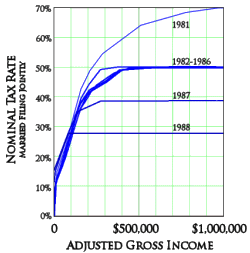
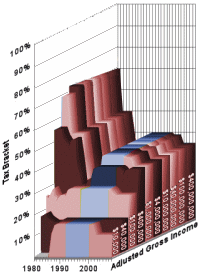
It doesn’t take an accountant to figure out what happened when he decreased our revenue, particularly since he actually increased spending – the National Debt soared.
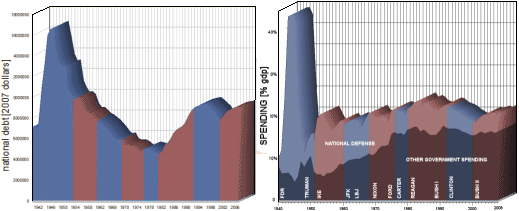
Since Reagan, Presidents have gone back and forth over fairly small differences in the tax rates. To me, the Republicans seem to be determined to keep taxation below the amount it would take to balance the budget.
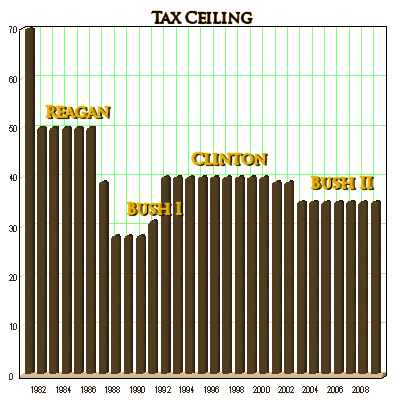
ECONOMY [The Great Recession]
As far as the economy is concerned, the Reagan "Revolution" gets mixed reviews depending on who is telling the story. The National Debt has risen from 32% of the GDP to approximately 90% largely through his deregulation and tax cuts. Unemployment is at near 10% and stuck. The building industry in on sabbatical. He did solve the Inflation problem but we seem to be drifting the other way now [deflation – much more ominous]. Only the Stock Market and the bank accounts of the very rich have benefited [is that "trickle up" economics?].
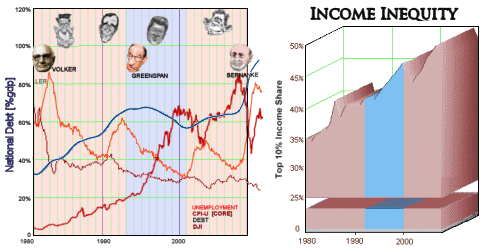
When I listen to the modern Republicans talk, they make no sense. Now they’re raving about paying down the Debt [they ran up], cutting taxes and spending [cutting spending is the opposite of what they’ve done], complaining about "welfare" programs, fighting to hold on to the "deregulation" that buried us, etc. It’s as if the only point of government is undoing the "New Deal" from so long ago. And they’ve done a lot of it already. Now they’re actively trying to put us in a financial pinch that means we have to jettison Social Security and Medicare. It might as well be 1928. Man, are they sore losers or what?…
Just spent 5 days in the hospital with my husband and I’m not in the mood to read much or watch tv of anything involving politics etc. About a year before former Gov. Ann Richards died she told Larry king on CNN exactly what you just wrote about bankrupting the country and when something has to be done saying we’re very sorry but we have to get rid of Social Security and Medicare because we have no money to pay for these “entitlement”: programs. I remember reading(I think it was in Kitty Kelly’s book “The family)” that Bush family starting with Senator Prescott Bush (W’s grandfather) wanted to do away with that awful entitlement program SS with all his might and will. W says when interviewed that his biggest regret as president was not privitizing SS. This whole present day political climate and meaness has made me very upset. I don’t think Obama has the will or the power that FDR and his sec of Labor Fraces Perkins had to help the majority of people who depend on our leaders to do the right thing and fight for us. He still talks compromise with the Republicans who haven’t comromised on anything before and will not now. Sen McConnell has said it’s Republicans jobs to prevent Obama from doing anything and to make Obama a one term president. The Republicans don’t seem to have a soul. This isn’t about right or wrong it’s about power and money.
I don’t exactly know how I found your site but I am so glad I did!Keep up the great work, we need more sane,caring and intelligent dialogue coming from the left!I also love the fact that you can also talk about other subjects like your post on Astronomy ,there are many things going on beside politics,(I still get my telescope out when I can,even though the north east is already getting cold ).
The Corporate right has greatly benefited over the last 15 years and is now poring money into Lobbyists,Front Groups ,Repub Political Campaigns and using the Supreme Court’s Corporate Favoritism Decisions!They are buying and now owning more and more Propaganda/Press Outlets,like Fux”news”,Wallstreet Journal,Comcast acquiring MSNBC(?)and especially AM Squawk Radio.It is very disheartening and seems like the left is now losing on all fronts;but 2 years ago they were saying that Dems will rule for 40 years,so go figure?People like Mellon Scaife,the Koch Brothers and Rupert Murdoch are the idea and money men behind these Welfare/Work Programs for rightwing crazies but their real agenda is more of the same old,Deregulation , Tax Cuts and a Corporate Take Over of our Government,which is nearly complete!That’s ONE of my many problems with the T/Baggers,they are being duped by these Malfeasant Corporate Interests and never spoke out while GW Bush and a Repub Congress more than DOUBLED the National Debt,Bankrupted the Country and BAILED OUT their Corporate Wallstreet Buddies!They also said that they were not really Repubs,yeah right?
Now finally to your point ,they are trying to destroy all of those Programs that you spoke of and more,didn’t the right’s guru , Grover Norquist,say “that he wanted Republicans to bankrupt and weaken the Federal Government to the point where they then could slowly strangle it in the bathtub”?These people are just evil,mean spirited ,hypocritical,FAUX Christian,CORPORATE SHILLS !
Thanks Again,
Steven
Unfortunately, your conclusion seems all too inescapable. I don’t want to believe that there’s been an undercurrent of hatred against FDR’s policies a-festering for longer than I’ve been alive. But there it is, like some creature from a grade-B movie. It has refused to die and is now hell-bent on revenge for the appalling injustice of having been forced to bail us out of the great depression, no matter that it was caused by their own wretched excess and greed.
But there’s also another perspective: the right’s quest to privatize social security – to do away with what they contemptuously call “entitlements†– is just us human beings being human. Greed is a perfectly human trait and always has been. What the greedy on the right want is to own it all and the hell with the rest of us. What makes it more dangerous now than in the near past is the power they presently have to make a serious run at it. As a judge once asked an old lawyer from the backwoods, “Tell me, Ed – Is there still as much fornicating going on up in Newport as there used to be?†And Ed answered, “Yes, Judge, there is; it’s just a different bunch doing it.â€
It really is greed, plain and simple. I guess that’s what “Regulation” is really about – managing greed. To deny its presence is to feel its bite…